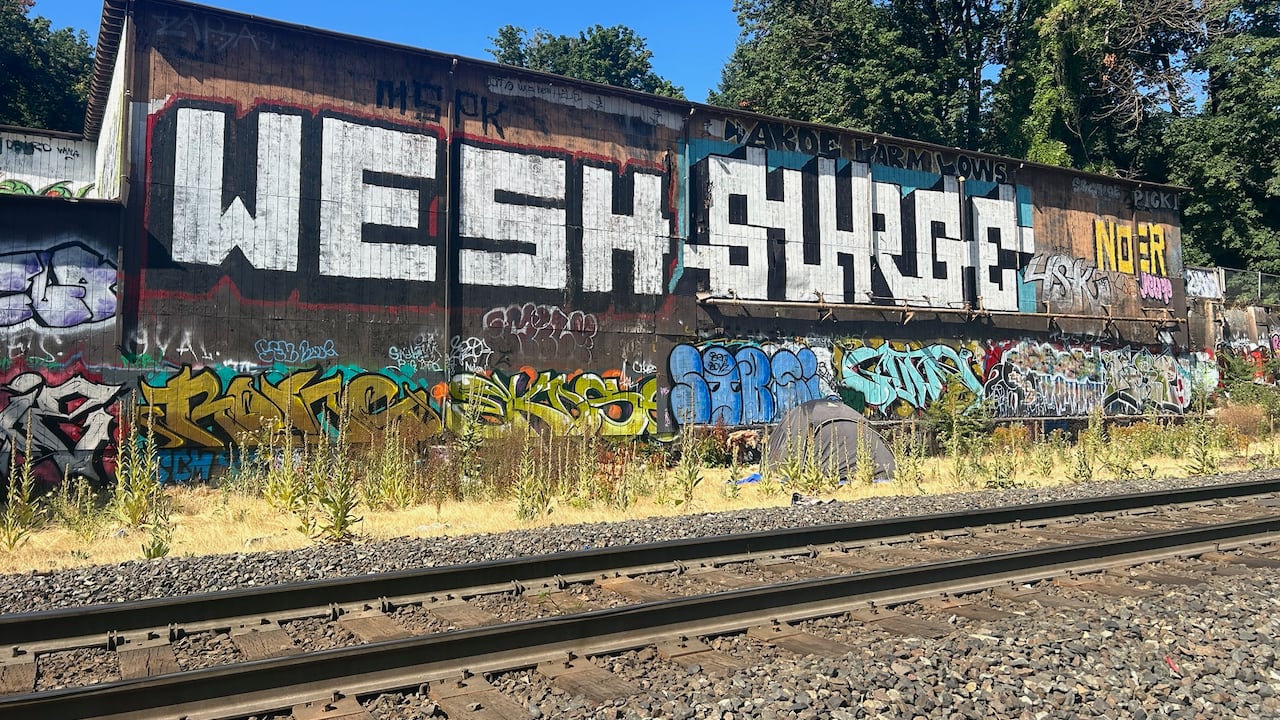ADDRESS: 2506 NE Multnomah St.
YEAR BUILT: 1910
SQUARE FOOTAGE: 65,060
MARKET VALUE: $1,538,070
OWNER: ZEK LLC
WHY IT’S EMPTY: It just looks empty. For decades, a clothing manufacturer has used the warehouse for storage.
Westbound motorists on Interstate 84 can’t miss one of Portland’s most notorious graffiti walls: a seemingly abandoned warehouse just below the 21st Avenue bridge.
The southern wall of the two-story building is easily visible from the highway and currently coated in colorful tags. On a recent weekend, a campsite, couch and supper table had been set up amid the grassy fields encircling the building.
Although the property is secured with a rickety padlocked fence, visitors sneak in on weekends to skateboard on the roof. About a decade ago, one interloper posted on Reddit what he’d found inside: “giant rolls of yarn.” A clue.
Not all of the activity on the property is so innocuous. Police show up a few times a year, sometimes in large numbers, according to neighbor Justin Arey.
One raid led to a 2012 police brutality settlement after a cop Tasered a suspected vandal. And three teens suspected of serial arson were indicted earlier this year on charges they targeted the building. “It’s a never-ending source of problems,” Arey says.
But despite appearances, Columbiaknit, a clothing manufacturer founded more than a century ago, still uses the building for storage. (Columbiaknit is not to be confused with the much larger Columbia Sportswear. The two firms were briefly entangled in a trademark dispute in the 1990s.)
Columbiaknit has quite a story. Jakob Kryszek purchased the company after he immigrated to Portland in 1952. Kryszek had spent stints at five different Nazi death camps, including Auschwitz, and was the only member of his family to survive the gas chambers, according to a biography published by the Oregon Jewish Museum and Center for Holocaust Education. He later played a pivotal role in establishing the Oregon Holocaust Memorial at Washington Park.
Kryszek expanded the clothing seller, purchasing the White Stag building downtown and the Northeast warehouse, a former timber plant, in the 1980s. He died in 2019, at the age of 100. The business is now run by one of his two children, Albert.
The firm continues to sell beanies and polos “made in the USA since 1921″ out of a factory in the Brentwood-Darlington neighborhood of Southeast Portland. But the graffiti-covered warehouse was recently put on the market for $4 million. The firm’s textile business has shrunk, Albert Kryszek says. “I think we could use the money better.”
Yvette Arey, who lives across the street with her husband, Justin, has an idea for prospective buyers: “We need affordable housing,” she says. “Let’s get people off the streets.”
Every week, WW examines one mysteriously vacant property in the city of Portland, explains why it’s empty, and considers what might arrive there next. Send addresses to newstips@wweek.com.

